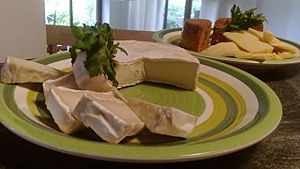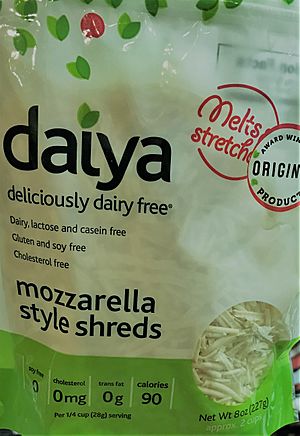Vegan cheese facts for kids
Vegan cheese is a type of cheese that is made from plants, not from animal milk. It's also called "plant-based cheese" or "dairy-free cheese." Just like regular cheese, vegan cheeses can be soft and fresh, or hard and aged, like Parmesan. The main thing that makes vegan cheese special is that it contains absolutely no animal products.
Vegan cheese can be made from many different plant parts. These include proteins, fats, and milks from vegetables. It can also be made from seeds like sesame and sunflower, or nuts such as cashew, pine nut, peanuts, and almond. Other common ingredients are coconut oil, nutritional yeast, tapioca, rice, potatoes, and spices.
Contents
A Brief History of Vegan Cheese
Did you know that non-dairy cheese first appeared in China? This was way back in the 16th century! It was often made from fermented tofu or whole soybeans.
Later, people started making homemade vegan cheeses using soy flour, margarine, and yeast extract. If they used harder margarine, they could make a firm vegan cheese that could be sliced. Softer margarine made a softer cheese that was easy to spread.
Vegan cheese began to be sold in stores around the 1970s or 1980s. These early versions weren't as good as dairy cheese or today's vegan cheeses. They sometimes felt waxy, chalky, or even plastic-like.
In the early 1990s, there was only one main brand of vegan cheese available in the United States called Soymage. Since then, many more types of vegan cheeses have become available, like mozzarella and cheddar. Companies also started making soy-free options. Back then, vegan cheese sometimes cost twice as much as regular cheese.
Between 2018 and 2020, several new companies started making animal-free cheese. Some of these companies even use special yeast to create milk proteins, just like cows do, but without using any animals!
The Growing Market for Vegan Cheese
The market for vegan cheese has been growing all over the world. In 2018, Europe had the biggest share of this market, followed by North America. Experts believe that the global vegan cheese market could be worth $3.9 billion by the end of 2024. This is a big jump from $2.1 billion in 2016!
In the United States, the market for plant-based foods is expected to reach $4 billion in sales by 2024. This growth is happening because more people are choosing plant-based foods. Also, more people are living in cities, and there's a greater interest in different international foods. Many grocery stores are adding more vegan cheeses to their shelves to meet this growing demand.
The most popular types of vegan cheese sold today are mozzarella, Parmesan, cheddar, Gouda, and cream cheese. You can find these vegan cheeses in restaurants, grocery stores, bakeries, and even in vegan school meals. Vegan cheeses are expected to become even more popular and varied in the next few years.
As of 2017, vegan cheese usually costs more than dairy cheese for shoppers.
How Vegan Cheese Is Labeled
The way vegan cheese is labeled can be a bit tricky. Dairy companies often want to stop plant-based products from using words like "cheese." In the European Union and the United Kingdom, it's not allowed to call purely plant-based products "cheese."
In 2019, a vegan cheese shop in Vancouver, British Columbia was told by a food agency to stop calling their products cheese. The agency said it could confuse customers. However, the shop always clearly labeled their products as "dairy-free" and "plant-based." Later, the agency changed its mind. They said it was fine to use "100% dairy-free plant-based cheese" as long as it was true.
The European Union has rules that say terms like "cheese" can only be used for products made from animal milk. In 2017, a court ruled that plant-based products could not be sold as "plant cheese" or "veggie cheese."
In the United Kingdom, there are strict rules for food labels. Words like "milk," "cheese," and "cream" are protected. They can only describe dairy products and not non-dairy ones. In 2019, a vegan cheese shop in Brixton, UK, was also asked to stop using the word "cheese." The store owners said their products were clearly marked as dairy-free.
In 2020, a vegan cheese company called Miyoko's Creamery took legal action against a California food department. This happened after the department told the company to stop using dairy words on its packaging. The company's founder, Miyoko Schinner, is a strong supporter of free speech rights for vegan foods.
What Vegan Cheese Is Made Of
The main ingredients in many vegan cheeses are nuts, soy milk, and soy yogurt. Common plant-based proteins come from foods like soybeans and almonds.
Food scientists use a mix of special ingredients like gums, proteins, and fats. This helps them create the right "feel" and melting quality that dairy cheese has. Cheeses made only from nuts often don't melt well because of their solid base. One new vegan cheese product is trying to solve this by making cheese with a special protein called casein, which is usually found in cow's milk, but they make it using yeast instead of cows!
Many vegan cheeses sold in stores are not aged or cultured. Instead, they use acidic ingredients like lemon juice to give them a cheesy taste. Some cheeses are made differently to get more texture and flavor. Ingredients for hard vegan cheeses can include natural thickeners like agar, carrageenan, tapioca flour, and xanthan gum.
Nutrition in Vegan Cheese
The nutritional value of vegan cheese can be different depending on the brand and type.
Most vegan cheeses have no cholesterol. They also usually have less saturated fat than dairy cheese. However, most vegan cheeses are low in calcium. Some brands, like Go Veggie, have similar calcium content to dairy cheese. Vegan cheese is generally not a good source of protein compared to dairy cheese.
A study from 1998 compared cheddar cheese to one type of vegan cheese. It found that the vegan cheese had fewer calories, less fat, and less protein. The vegan cheese had more riboflavin and vitamin B12. This made it a good substitute for cheddar cheese for those nutrients. But the vegan cheese did not provide vitamin A or vitamin D, which cheddar cheese does. The vegan cheese was a helpful source of calcium, but not as good as cheddar cheese.
Some vegan cheeses may have extra vitamin B12 added to them, while others do not.
How Vegan Cheese Is Made
Plant-based proteins come from edible sources like soybeans and their milk. The process of fermentation is often used to make vegan cheese. This helps to create a texture and flavor similar to dairy cheese.
However, making vegan cheese is different from making dairy cheese. The proteins in plant-based milk react differently to the things that cause fermentation. They don't thicken in the same way traditional cheese does. Vegan cheese needs to be aged using other methods. This includes carefully checking the temperature and humidity. Some people use culturing agents like rejuvelac, non-dairy yogurt, or kombucha. But using these can be risky if not done properly. If the process is not done with good hygiene and correct fermentation, the product could contain harmful germs like Salmonella or Listeria.
Bans on Vegan Cheese
In 2022, the production and sale of vegan cheese were banned in Turkey.
Images for kids
-
Gnocchi made with vegan cheese
 | Calvin Brent |
 | Walter T. Bailey |
 | Martha Cassell Thompson |
 | Alberta Jeannette Cassell |






